We care about the future of our planet in our business operations
The extent of global climate change is already noticeable today. It includes weather extremes like droughts, floods and storms, rising sea levels and mounting economic effects such as reduced harvests. Many of the current social tensions and conflicts are also associated with the consequences of climate change.
As a retail company with international operations we are conscious of our shared responsibility when it comes to finding answers to these challenges. To make sure we conduct our core business successfully and satisfy the needs of our customers, we need energy and natural resources today as well as tomorrow – so that we can transport and store products properly, refrigerate fresh produce and also maintain our stores and administrative offices. By taking a responsible approach to our use of finite resources such as fossil fuels and other raw materials, we can directly influence the cost of our business activities, anticipate environmental regulations and make a contribution to the protection of the climate and resources.
Within our operations, our measures for lowering greenhouse gas emissions and consequently helping to protect the planet are focused on 3 main areas:
- improving energy efficiency and making energy savings,
- optimising resource consumption and
- reducing and preventing waste.
Experience in handling these issues can also be factored into solutions for METRO customers in the future, for example when offering advice to independent entrepreneurs regarding energy-efficient kitchen fittings. Consequently, the customer can also save money and environmental impacts can be mitigated.
METRO’s climate protection target
Our operations are associated with emissions that affect the climate. METRO has set its sights on reducing its specific greenhouse gas emissions by 50% per square metre of selling and delivery space by 2030 compared to 2011.
To achieve this, we have resolved to
- consume 35% less electricity compared to the reference year 2011,
- reduce climate-damaging refrigerant emissions by 90% by 2030 compared to the reference year 2011 by using natural refrigerants,
- generate significant amounts of emission-free renewable energy ourselves, for instance by using photovoltaic systems in wholesale stores and hypermarkets, and
- introduce certified energy management systems according to ISO 50001 or energy audits according to EN 16247 at all locations in the EU.
Status of climate protection target
Between October 2017 and September 2018, METRO generated 276 kilograms of CO2 equivalents per square metre of selling and delivery space. In the same period of the previous year, it was still 288 kilograms.
In financial year 2017/18, we switched to different software for sustainability data management. This also entailed changes to methodology and new emissions factors for calculating greenhouse gas emissions. In addition, we have extended the scope of our climate protection target to cover space used for delivery as well as selling space, in order to reflect the fact that delivery now accounts for a rapidly increasing proportion of our business. Overall, there has been a positive effect of 2.5 percentage points towards reaching this target.
Greenhouse gas emissions in kg CO2 (CO2 equivalents) per m2 of selling space
METRO
Germany
More in-depth information on METRO’s carbon footprint is available in the chapter on key performance indicators.
Added value through electromobility

Added value through electromobility For us, increased use of electric vehicles is not just an important step towards achieving our climate protection target, but also towards offering our customers all over the world an additional service and added value. When we joined the international Electric Vehicle 100 (EV100) initiative in October 2017, we therefore signed up to actively promote electromobility.
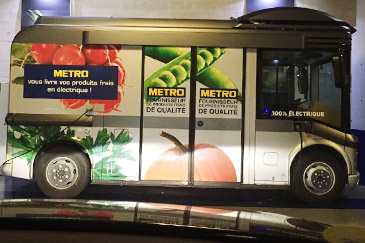
In Austria, the Netherlands and France we already use 12 electric vans, 2 hybrid trucks and 3 electric buses to deliver to our customers. In addition, one fully electric 28-tonne truck delivers goods to METRO stores in the Vienna area. Our detailed road map also includes plans to expand effective infrastructure at METRO locations. METRO already has 239 charging points in 11 countries, which means we have already considerably exceeded our original EV100 target for 2018 of installing more than 181 charging points. In some countries, like Bulgaria for example, nearly all the METRO stores (8 out of 12) now have charging stations that allow our customers to charge their electric cars while shopping. More than 1,000 charging points are to be installed at METRO stores by 2030. We will achieve this target with the help of 5-year strategy plans submitted to the EV100 initiative.
Energy provider for our customers
METRO is going one step further for its customers, while also helping to reduce greenhouse gases, by becoming an electricity provider to our customers or helping them switch to a low-cost, environmentally friendly electricity provider. Through various METRO electricity and gas partnerships we are already helping participating businesses in 3 countries to reduce their energy consumption and energy costs simply and effectively. At the same time, partnerships of this kind relieve our customers of the bureaucracy of having to deal with their own energy contracts.
The energy experts at METRO Germany’s partner Ampere have been analysing the individual situation of participating customers since February 2018 and finding them better offers.
METRO’s customers in Austria have been offered contracts for sustainably generated hydropower and smart-home energy management solutions since May 2018 through our partner VERBUND. In June 2018, the offer was also extended to employees at METRO Austria. To accompany this offer, information material was made available in all stores during an ‘energy week’.
In France, METRO offers natural gas contracts through its partner TOTAL. To improve our customers’ energy contracts, we also worked with our partner Economie d’Energie and offered 700 professional customers the opportunity to obtain their electricity requirements from renewable energy sources. METRO then offered bundled contract negotiations for this purpose. In addition, HoReCa customers can find out how to reduce their water and energy consumption on a website designed in collaboration with Economie d’Energie.
Improving energy efficiency and making energy savings
To improve energy efficiency at our locations, we are focusing on behavioural changes (Energy Awareness Programme) and investments (Energy-Saving Programme). These are reducing our energy requirements and cutting costs.
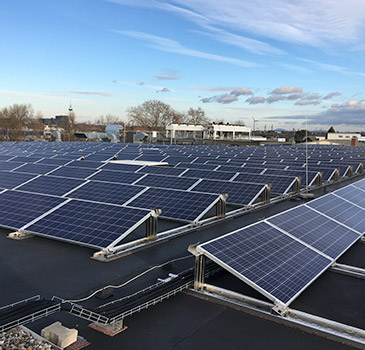
In financial year 2017/18, our investments included €10 million in METRO Wholesale’s Energy-Saving Programme, which will save us around €2.8 million each year in energy costs. Examples of measures carried out in the reporting period include:
- Opening our third green store in China with much lower energy requirements than conventional METRO stores
- Installing additional photovoltaic systems and expanding our total solar capacity to more than 19,000 kWp; our photovoltaic systems in China, Germany, Pakistan, India and Japan are cutting-edge
- Heat recovery measures in a number of stores
- Switching from diesel to compressed natural gas (CNG) in some Bulgarian stores
In addition, in October 2017, METRO opened a zero-energy wholesale store in St Pölten, Austria – the first store to generate all its own energy and zero greenhouse gas emissions.
Optimisation of resource consumption
As part of our corporate and climate protection strategy, we also pay attention to responsible resource management. This is based on the METRO environment guideline. With this, we have made a commitment to taking a responsible approach to the environment and to natural resources. The fields of application are numerous and include logistics fleets and sustainable building management, but also the use of refrigerants, paper and conventional plastic in our own business operations.
We are systematically switching the logistics fleet of METRO LOGISTICS Germany GmbH to lower-emission vehicles. The vast majority of vehicles already meet the Euro 6 emissions standard.
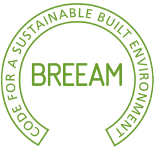
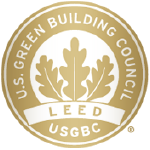
Some of our buildings are certified according to standards for sustainable construction and building management. For instance, the green stores in Dongguan and Shanghai’s Putuo district are certified to the LEED Gold standard and a building at the group’s headquarters in Düsseldorf is certified to BREEAM.
Wherever technically feasible, we switch to natural refrigerants for our stores’ cooling systems, as these are considerably less harmful to the climate. In financial year 2017/18, we started using more transcritical refrigeration systems, including in Bulgaria, Russia and China. Transcritical systems use CO2 as a natural refrigerant for both deep-freezing and normal cooling functions. The transcritical cooling system in store IV in Beijing is the first system of this kind in China’s commercial retail sector.
Even supposedly simple things like using resource-saving paper can have an impact: the paper we use for our promotional materials comes exclusively from sustainably managed forests. The FSC®-certified proportion is over 90%, and more than 95% of the paper we use has a recycled fibre content of up to 100%. We intend to increase the proportion of recycled fibres further where possible. For instance, back in 2015, we switched to paper certified with the Blue Angel environmental label for all photocopying at our headquarters in Düsseldorf.
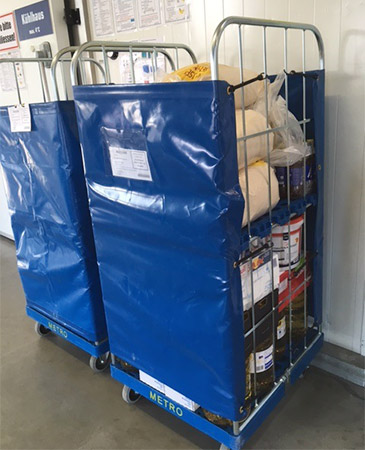
To cut plastic waste, METRO Austria developed a sustainable solution for the Food Service Distribution (FSD) division. Usually, the roll containers used to deliver products to customers are covered with disposable plastic wrap before transport. In October 2018, following a successful 1-year test phase, METRO Austria switched to a reusable METRO tarpaulin instead. This solution will be introduced in all our wholesale stores in Austria by the end of December 2018. As well as the cost benefit, the focus is on the considerable reduction in waste as a result of no longer using the plastic wrap.
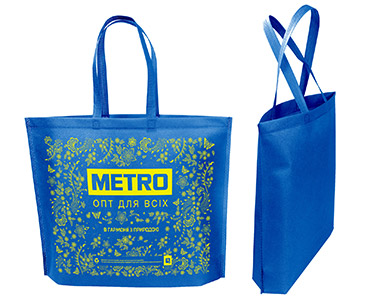
In order to raise awareness among customers about sustainable plastics use, METRO Ukraine introduced an environmentally friendly bag in all its wholesale stores in June 2018. As part of the accompanying ‘Become a hero: save the world from plastic’ campaign, the wholesale stores are also distributing information and tips to customers, including advice to reuse plastic bags, to use them only when necessary and to use the tongs available rather than disposable gloves when packing products in-store.
Our mission is to replace disposable solutions with reusable systems in our company canteens by 2019.
Reducing and avoiding waste
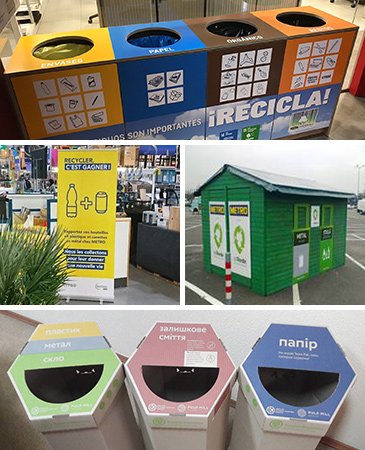
We see anything that lands in the rubbish bin as a waste of resources. This is why it is important to us to promote innovative manufacturing and recycling technologies and create closed cycles. As our products and packaging are in our customers’ possession when they reach the end of their useful life, we advise our customers on the best way to dispose of them: at selected stores, we raise our customers’ awareness of resources, inform them about ways to avoid waste and create incentives and options for disposing of products properly, e.g. in China, France, Romania and Ukraine, by installing recycling containers in the car parks of our stores. In this way, we help ensure that resources are turned back into raw materials.
More and more METRO country organisations are starting to address the issue of proper waste disposal also in the offices: The installation of separate recycling containers not only provides employees with casually informative knowledge, but also encourages them to separate waste properly.
Avoiding food waste and loss
Reducing food loss is of particular importance to us. Every food item that is not consumed but rejected or discarded constitutes economic, social and ecological waste, for example disposal costs, hunger or the greenhouse gases produced during incineration. For this reason, METRO has committed itself to a 50% reduction in food loss at its stores by 2025 in accordance with The Consumer Goods Forum’s Resolution on Food Waste.
Whole Surplus

As of January 2018, METRO has a partner in Turkey that approaches the issue of food waste reduction holistically, like an ecosystem: Whole Surplus, a participant in the first round of the METRO Accelerator for Retail 2017 powered by Techstars. The starting situation in Turkey calls for urgent action because up to 80% of food that cannot be sold ends up in landfill, which means it leaves the food chain and cannot be put to any other use consistent with the food recovery hierarchy. Through METRO’s partnership with Whole Surplus and making use of the digital marketplace, our stores can easily give edible food to food banks, social institutions or animal shelters. In addition, the data analysis function lets us quantify and monitor food waste transparently in real time, enabling us to implement targeted measures to further improve processes in our own operations. This not only saves costs associated with waste, but also means that edible food is put to good use.
From January to the end of September 2018, 3,860 tonnes of food waste was recorded in 21 METRO wholesale stores in Turkey. Just under 912 tonnes of this was sent as animal feed to animal shelters and 2,948 tonnes was disposed of in landfill sites. Over the same period, the partnership with 30 Turkish food bank organisations made it possible to donate 104 tonnes of food.
Because of the successful pilot project in Turkey, Whole Surplus is already in discussion with other METRO countries, including Germany, Italy, Spain and Pakistan, with a view to extending the project to these countries.
Food recovery
Since 2017, to reduce food waste and as a meaningful addition to our work with the food banks, METRO Germany has been working with SIRPLUS in Berlin. The Berlin start-up collects surplus food and drink from our wholesale stores that can no longer be sold or passed on to organisations like the food banks, and sells it cheaply online and in the 3 SIRPLUS stores in Berlin. The young company’s mission is to increase people’s respect for food and to work with the entire food industry to revolutionise food recovery.
Detailed analysis – minimum waste
In the fight against food waste, METRO is also offering its customers, especially professionals in the HoReCa sector, access to solutions to reduce their own food waste. KITRO, another start-up and a participant in the third round of the METRO Accelerator powered by Techstars, is on a mission to minimise food waste. The young business targets food service operations. KITRO offers restaurants and canteens a fully automated solution for managing food waste, using hardware and software to track and analyse discarded food. The data give users a detailed overview of the weight and cost of food waste and help them identify sources of waste, remedy operational inefficiencies and use resources more efficiently. Mercure Hotel Berlin City, a METRO customer, has already tested the KITRO solution and was able to cut catering waste by 22% over a 3-month pilot phase.
Meat for charitable soup kitchens
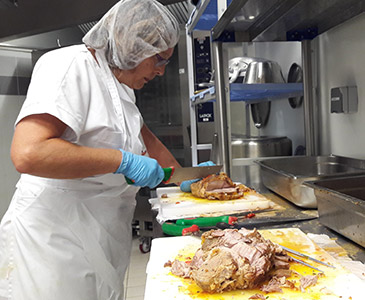
Not all food can be given to social initiatives like food banks without restrictions. Donations of meat and fish products, for instance, are subject to special health regulations
In France, METRO is supporting the establishment of charitable soup kitchens that meet these requirements and can therefore accept meat products. In 2018, METRO France entered into 8 new partnerships. There are now 37 of these partnerships in France and meat donations have increased to 16% since the start of the campaign in 2015. The aim of METRO France is to establish similar partnerships for all French METRO stores.